Leadership Qualities Vital for Organizational Effectiveness - Essay
VerifiedAdded on 2020/12/30
|11
|3925
|170
Essay
AI Summary
This essay examines the crucial leadership qualities that contribute to organizational effectiveness. It begins by emphasizing the vital role leaders play in enhancing employee performance and achieving common goals. The essay delves into various leadership styles, including situational and participative theories, highlighting their advantages and disadvantages in different organizational contexts. It underscores the importance of communication skills, problem-solving abilities, and the ability to adapt to change as essential traits for effective leaders. The essay also explores key models and theories, such as the situational, participative, and behavioral theories of leadership. The essay concludes with the importance of leaders possessing qualities to fulfill their responsibilities and lead their team to achieve organizational goals. Finally, the essay evaluates the views and opinions of different authors on leadership qualities.
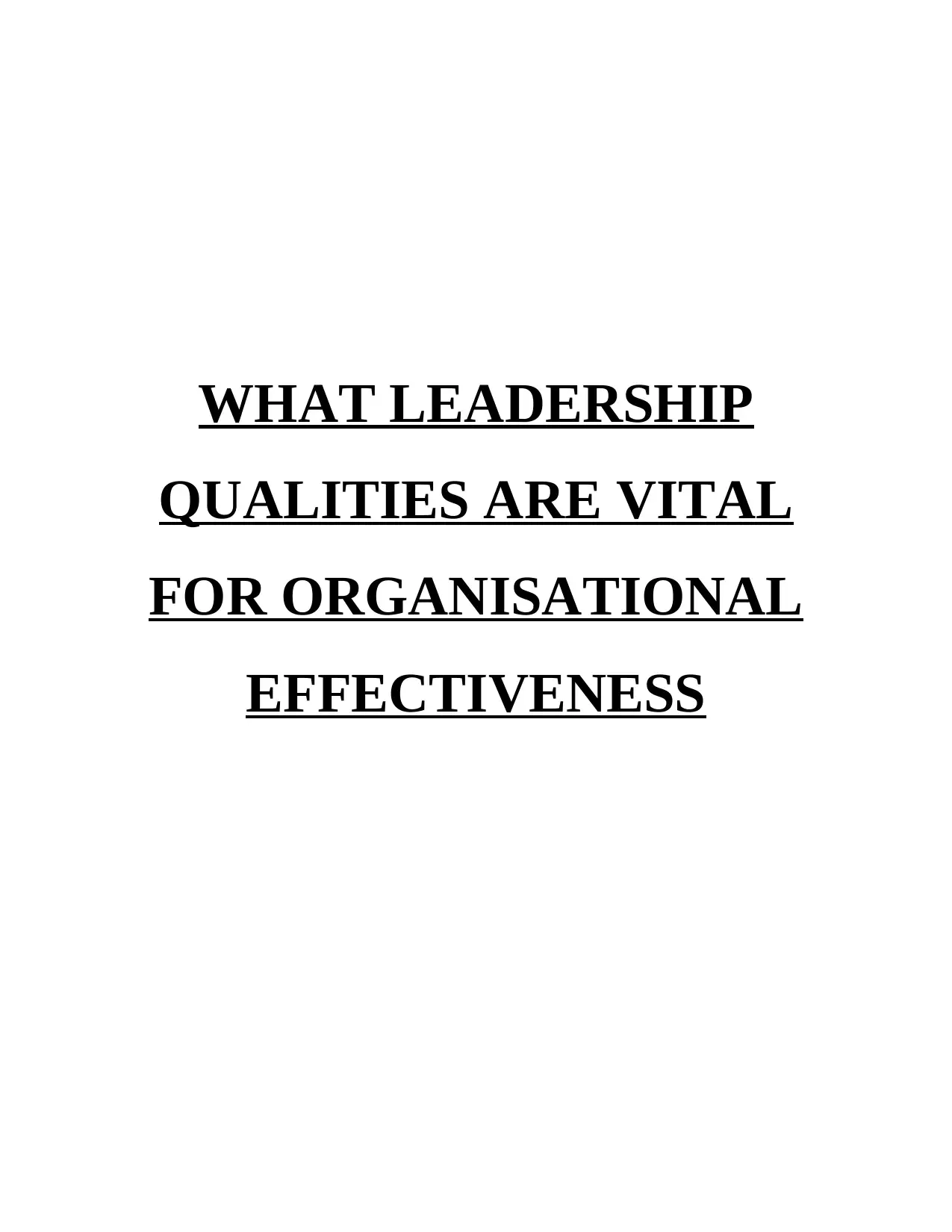
WHAT LEADERSHIP
QUALITIES ARE VITAL
FOR ORGANISATIONAL
EFFECTIVENESS
QUALITIES ARE VITAL
FOR ORGANISATIONAL
EFFECTIVENESS
Paraphrase This Document
Need a fresh take? Get an instant paraphrase of this document with our AI Paraphraser
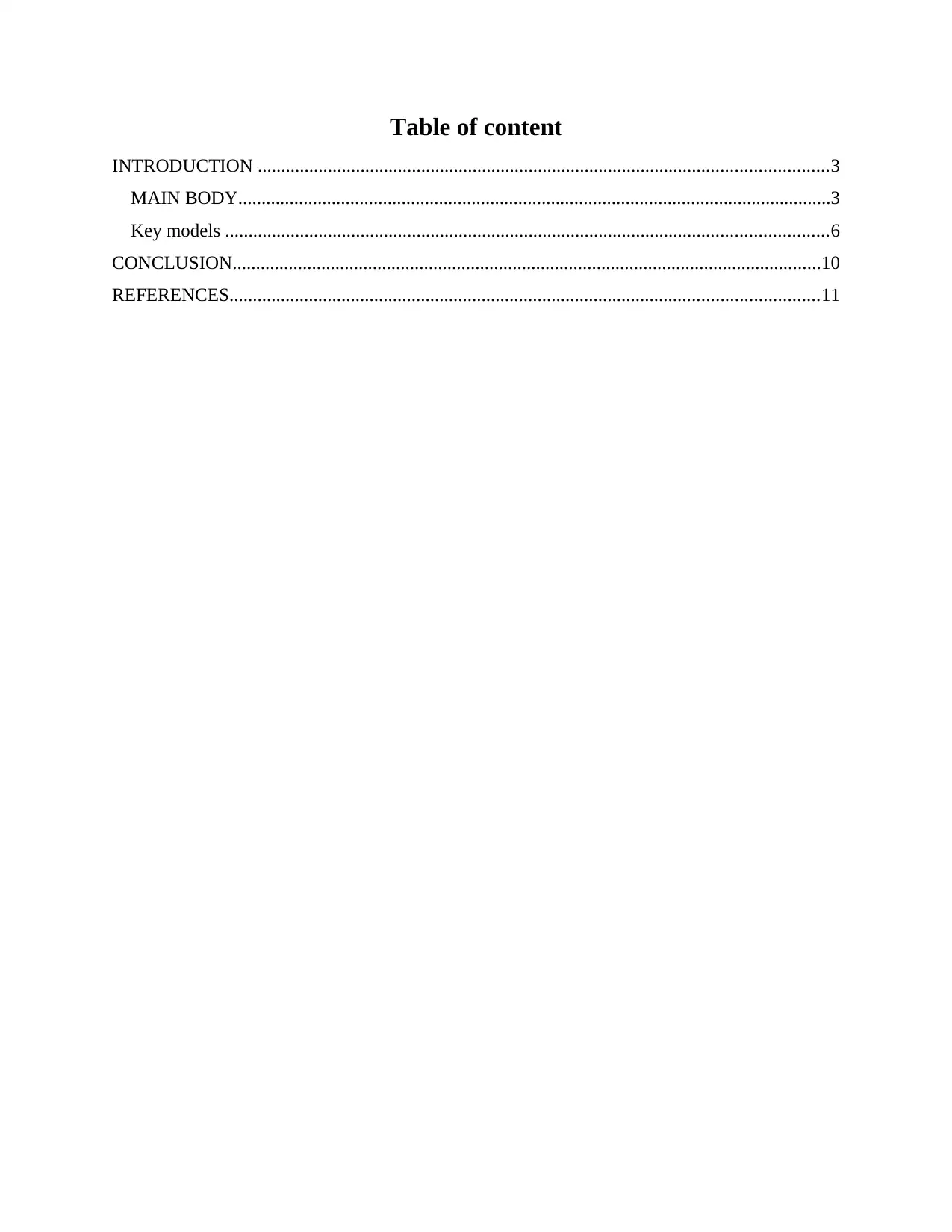
Table of content
INTRODUCTION ..........................................................................................................................3
MAIN BODY...............................................................................................................................3
Key models .................................................................................................................................6
CONCLUSION..............................................................................................................................10
REFERENCES..............................................................................................................................11
INTRODUCTION ..........................................................................................................................3
MAIN BODY...............................................................................................................................3
Key models .................................................................................................................................6
CONCLUSION..............................................................................................................................10
REFERENCES..............................................................................................................................11
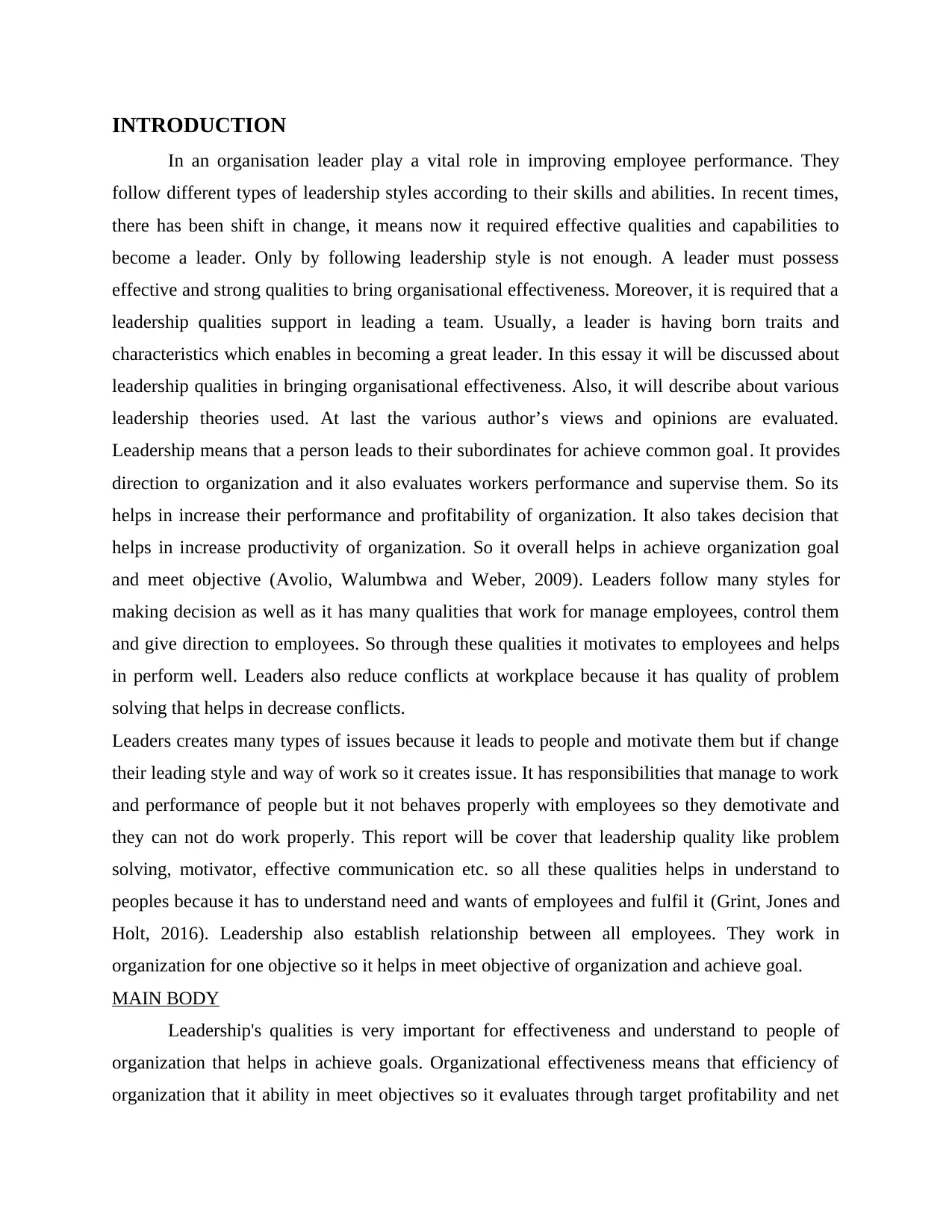
INTRODUCTION
In an organisation leader play a vital role in improving employee performance. They
follow different types of leadership styles according to their skills and abilities. In recent times,
there has been shift in change, it means now it required effective qualities and capabilities to
become a leader. Only by following leadership style is not enough. A leader must possess
effective and strong qualities to bring organisational effectiveness. Moreover, it is required that a
leadership qualities support in leading a team. Usually, a leader is having born traits and
characteristics which enables in becoming a great leader. In this essay it will be discussed about
leadership qualities in bringing organisational effectiveness. Also, it will describe about various
leadership theories used. At last the various author’s views and opinions are evaluated.
Leadership means that a person leads to their subordinates for achieve common goal. It provides
direction to organization and it also evaluates workers performance and supervise them. So its
helps in increase their performance and profitability of organization. It also takes decision that
helps in increase productivity of organization. So it overall helps in achieve organization goal
and meet objective (Avolio, Walumbwa and Weber, 2009). Leaders follow many styles for
making decision as well as it has many qualities that work for manage employees, control them
and give direction to employees. So through these qualities it motivates to employees and helps
in perform well. Leaders also reduce conflicts at workplace because it has quality of problem
solving that helps in decrease conflicts.
Leaders creates many types of issues because it leads to people and motivate them but if change
their leading style and way of work so it creates issue. It has responsibilities that manage to work
and performance of people but it not behaves properly with employees so they demotivate and
they can not do work properly. This report will be cover that leadership quality like problem
solving, motivator, effective communication etc. so all these qualities helps in understand to
peoples because it has to understand need and wants of employees and fulfil it (Grint, Jones and
Holt, 2016). Leadership also establish relationship between all employees. They work in
organization for one objective so it helps in meet objective of organization and achieve goal.
MAIN BODY
Leadership's qualities is very important for effectiveness and understand to people of
organization that helps in achieve goals. Organizational effectiveness means that efficiency of
organization that it ability in meet objectives so it evaluates through target profitability and net
In an organisation leader play a vital role in improving employee performance. They
follow different types of leadership styles according to their skills and abilities. In recent times,
there has been shift in change, it means now it required effective qualities and capabilities to
become a leader. Only by following leadership style is not enough. A leader must possess
effective and strong qualities to bring organisational effectiveness. Moreover, it is required that a
leadership qualities support in leading a team. Usually, a leader is having born traits and
characteristics which enables in becoming a great leader. In this essay it will be discussed about
leadership qualities in bringing organisational effectiveness. Also, it will describe about various
leadership theories used. At last the various author’s views and opinions are evaluated.
Leadership means that a person leads to their subordinates for achieve common goal. It provides
direction to organization and it also evaluates workers performance and supervise them. So its
helps in increase their performance and profitability of organization. It also takes decision that
helps in increase productivity of organization. So it overall helps in achieve organization goal
and meet objective (Avolio, Walumbwa and Weber, 2009). Leaders follow many styles for
making decision as well as it has many qualities that work for manage employees, control them
and give direction to employees. So through these qualities it motivates to employees and helps
in perform well. Leaders also reduce conflicts at workplace because it has quality of problem
solving that helps in decrease conflicts.
Leaders creates many types of issues because it leads to people and motivate them but if change
their leading style and way of work so it creates issue. It has responsibilities that manage to work
and performance of people but it not behaves properly with employees so they demotivate and
they can not do work properly. This report will be cover that leadership quality like problem
solving, motivator, effective communication etc. so all these qualities helps in understand to
peoples because it has to understand need and wants of employees and fulfil it (Grint, Jones and
Holt, 2016). Leadership also establish relationship between all employees. They work in
organization for one objective so it helps in meet objective of organization and achieve goal.
MAIN BODY
Leadership's qualities is very important for effectiveness and understand to people of
organization that helps in achieve goals. Organizational effectiveness means that efficiency of
organization that it ability in meet objectives so it evaluates through target profitability and net
⊘ This is a preview!⊘
Do you want full access?
Subscribe today to unlock all pages.

Trusted by 1+ million students worldwide
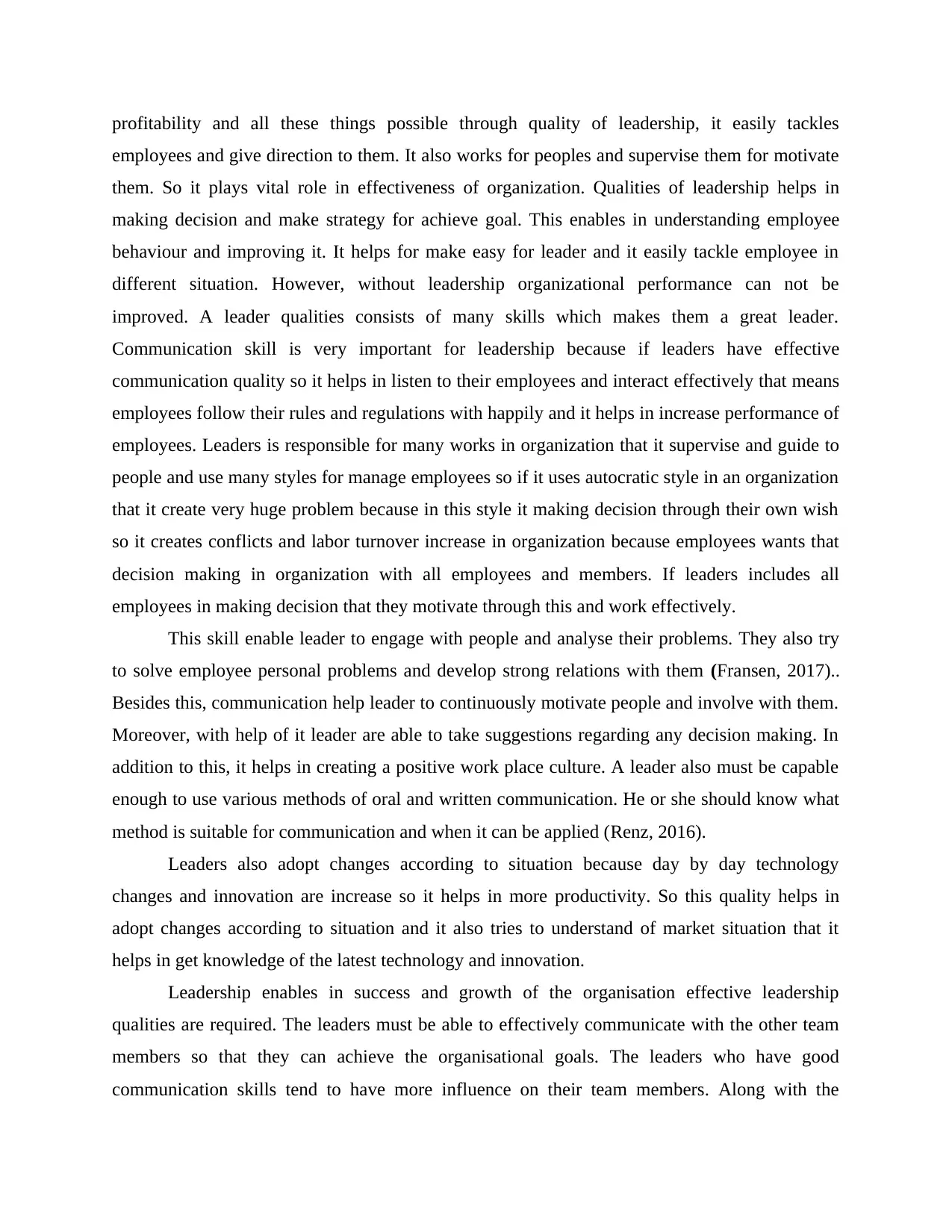
profitability and all these things possible through quality of leadership, it easily tackles
employees and give direction to them. It also works for peoples and supervise them for motivate
them. So it plays vital role in effectiveness of organization. Qualities of leadership helps in
making decision and make strategy for achieve goal. This enables in understanding employee
behaviour and improving it. It helps for make easy for leader and it easily tackle employee in
different situation. However, without leadership organizational performance can not be
improved. A leader qualities consists of many skills which makes them a great leader.
Communication skill is very important for leadership because if leaders have effective
communication quality so it helps in listen to their employees and interact effectively that means
employees follow their rules and regulations with happily and it helps in increase performance of
employees. Leaders is responsible for many works in organization that it supervise and guide to
people and use many styles for manage employees so if it uses autocratic style in an organization
that it create very huge problem because in this style it making decision through their own wish
so it creates conflicts and labor turnover increase in organization because employees wants that
decision making in organization with all employees and members. If leaders includes all
employees in making decision that they motivate through this and work effectively.
This skill enable leader to engage with people and analyse their problems. They also try
to solve employee personal problems and develop strong relations with them (Fransen, 2017)..
Besides this, communication help leader to continuously motivate people and involve with them.
Moreover, with help of it leader are able to take suggestions regarding any decision making. In
addition to this, it helps in creating a positive work place culture. A leader also must be capable
enough to use various methods of oral and written communication. He or she should know what
method is suitable for communication and when it can be applied (Renz, 2016).
Leaders also adopt changes according to situation because day by day technology
changes and innovation are increase so it helps in more productivity. So this quality helps in
adopt changes according to situation and it also tries to understand of market situation that it
helps in get knowledge of the latest technology and innovation.
Leadership enables in success and growth of the organisation effective leadership
qualities are required. The leaders must be able to effectively communicate with the other team
members so that they can achieve the organisational goals. The leaders who have good
communication skills tend to have more influence on their team members. Along with the
employees and give direction to them. It also works for peoples and supervise them for motivate
them. So it plays vital role in effectiveness of organization. Qualities of leadership helps in
making decision and make strategy for achieve goal. This enables in understanding employee
behaviour and improving it. It helps for make easy for leader and it easily tackle employee in
different situation. However, without leadership organizational performance can not be
improved. A leader qualities consists of many skills which makes them a great leader.
Communication skill is very important for leadership because if leaders have effective
communication quality so it helps in listen to their employees and interact effectively that means
employees follow their rules and regulations with happily and it helps in increase performance of
employees. Leaders is responsible for many works in organization that it supervise and guide to
people and use many styles for manage employees so if it uses autocratic style in an organization
that it create very huge problem because in this style it making decision through their own wish
so it creates conflicts and labor turnover increase in organization because employees wants that
decision making in organization with all employees and members. If leaders includes all
employees in making decision that they motivate through this and work effectively.
This skill enable leader to engage with people and analyse their problems. They also try
to solve employee personal problems and develop strong relations with them (Fransen, 2017)..
Besides this, communication help leader to continuously motivate people and involve with them.
Moreover, with help of it leader are able to take suggestions regarding any decision making. In
addition to this, it helps in creating a positive work place culture. A leader also must be capable
enough to use various methods of oral and written communication. He or she should know what
method is suitable for communication and when it can be applied (Renz, 2016).
Leaders also adopt changes according to situation because day by day technology
changes and innovation are increase so it helps in more productivity. So this quality helps in
adopt changes according to situation and it also tries to understand of market situation that it
helps in get knowledge of the latest technology and innovation.
Leadership enables in success and growth of the organisation effective leadership
qualities are required. The leaders must be able to effectively communicate with the other team
members so that they can achieve the organisational goals. The leaders who have good
communication skills tend to have more influence on their team members. Along with the
Paraphrase This Document
Need a fresh take? Get an instant paraphrase of this document with our AI Paraphraser
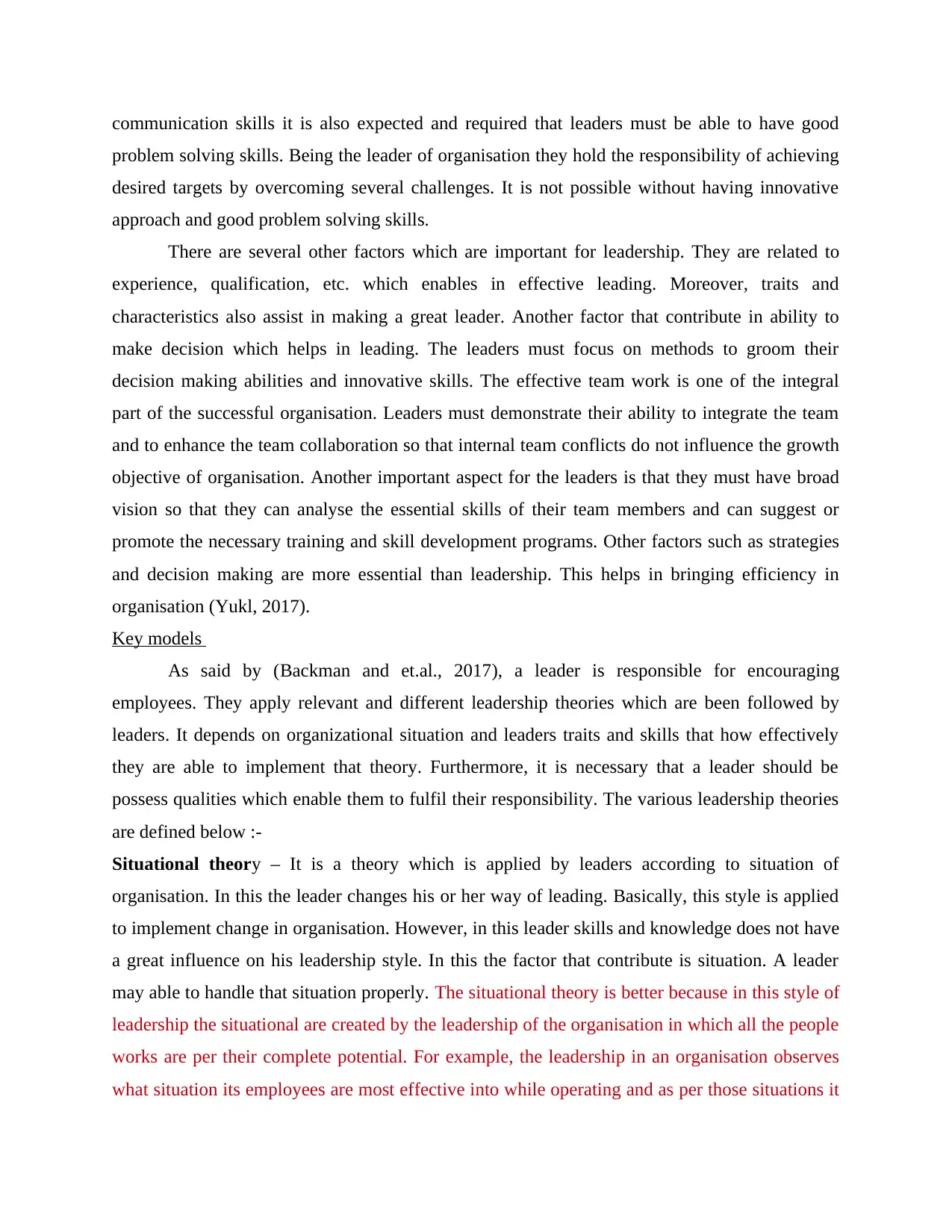
communication skills it is also expected and required that leaders must be able to have good
problem solving skills. Being the leader of organisation they hold the responsibility of achieving
desired targets by overcoming several challenges. It is not possible without having innovative
approach and good problem solving skills.
There are several other factors which are important for leadership. They are related to
experience, qualification, etc. which enables in effective leading. Moreover, traits and
characteristics also assist in making a great leader. Another factor that contribute in ability to
make decision which helps in leading. The leaders must focus on methods to groom their
decision making abilities and innovative skills. The effective team work is one of the integral
part of the successful organisation. Leaders must demonstrate their ability to integrate the team
and to enhance the team collaboration so that internal team conflicts do not influence the growth
objective of organisation. Another important aspect for the leaders is that they must have broad
vision so that they can analyse the essential skills of their team members and can suggest or
promote the necessary training and skill development programs. Other factors such as strategies
and decision making are more essential than leadership. This helps in bringing efficiency in
organisation (Yukl, 2017).
Key models
As said by (Backman and et.al., 2017), a leader is responsible for encouraging
employees. They apply relevant and different leadership theories which are been followed by
leaders. It depends on organizational situation and leaders traits and skills that how effectively
they are able to implement that theory. Furthermore, it is necessary that a leader should be
possess qualities which enable them to fulfil their responsibility. The various leadership theories
are defined below :-
Situational theory – It is a theory which is applied by leaders according to situation of
organisation. In this the leader changes his or her way of leading. Basically, this style is applied
to implement change in organisation. However, in this leader skills and knowledge does not have
a great influence on his leadership style. In this the factor that contribute is situation. A leader
may able to handle that situation properly. The situational theory is better because in this style of
leadership the situational are created by the leadership of the organisation in which all the people
works are per their complete potential. For example, the leadership in an organisation observes
what situation its employees are most effective into while operating and as per those situations it
problem solving skills. Being the leader of organisation they hold the responsibility of achieving
desired targets by overcoming several challenges. It is not possible without having innovative
approach and good problem solving skills.
There are several other factors which are important for leadership. They are related to
experience, qualification, etc. which enables in effective leading. Moreover, traits and
characteristics also assist in making a great leader. Another factor that contribute in ability to
make decision which helps in leading. The leaders must focus on methods to groom their
decision making abilities and innovative skills. The effective team work is one of the integral
part of the successful organisation. Leaders must demonstrate their ability to integrate the team
and to enhance the team collaboration so that internal team conflicts do not influence the growth
objective of organisation. Another important aspect for the leaders is that they must have broad
vision so that they can analyse the essential skills of their team members and can suggest or
promote the necessary training and skill development programs. Other factors such as strategies
and decision making are more essential than leadership. This helps in bringing efficiency in
organisation (Yukl, 2017).
Key models
As said by (Backman and et.al., 2017), a leader is responsible for encouraging
employees. They apply relevant and different leadership theories which are been followed by
leaders. It depends on organizational situation and leaders traits and skills that how effectively
they are able to implement that theory. Furthermore, it is necessary that a leader should be
possess qualities which enable them to fulfil their responsibility. The various leadership theories
are defined below :-
Situational theory – It is a theory which is applied by leaders according to situation of
organisation. In this the leader changes his or her way of leading. Basically, this style is applied
to implement change in organisation. However, in this leader skills and knowledge does not have
a great influence on his leadership style. In this the factor that contribute is situation. A leader
may able to handle that situation properly. The situational theory is better because in this style of
leadership the situational are created by the leadership of the organisation in which all the people
works are per their complete potential. For example, the leadership in an organisation observes
what situation its employees are most effective into while operating and as per those situations it
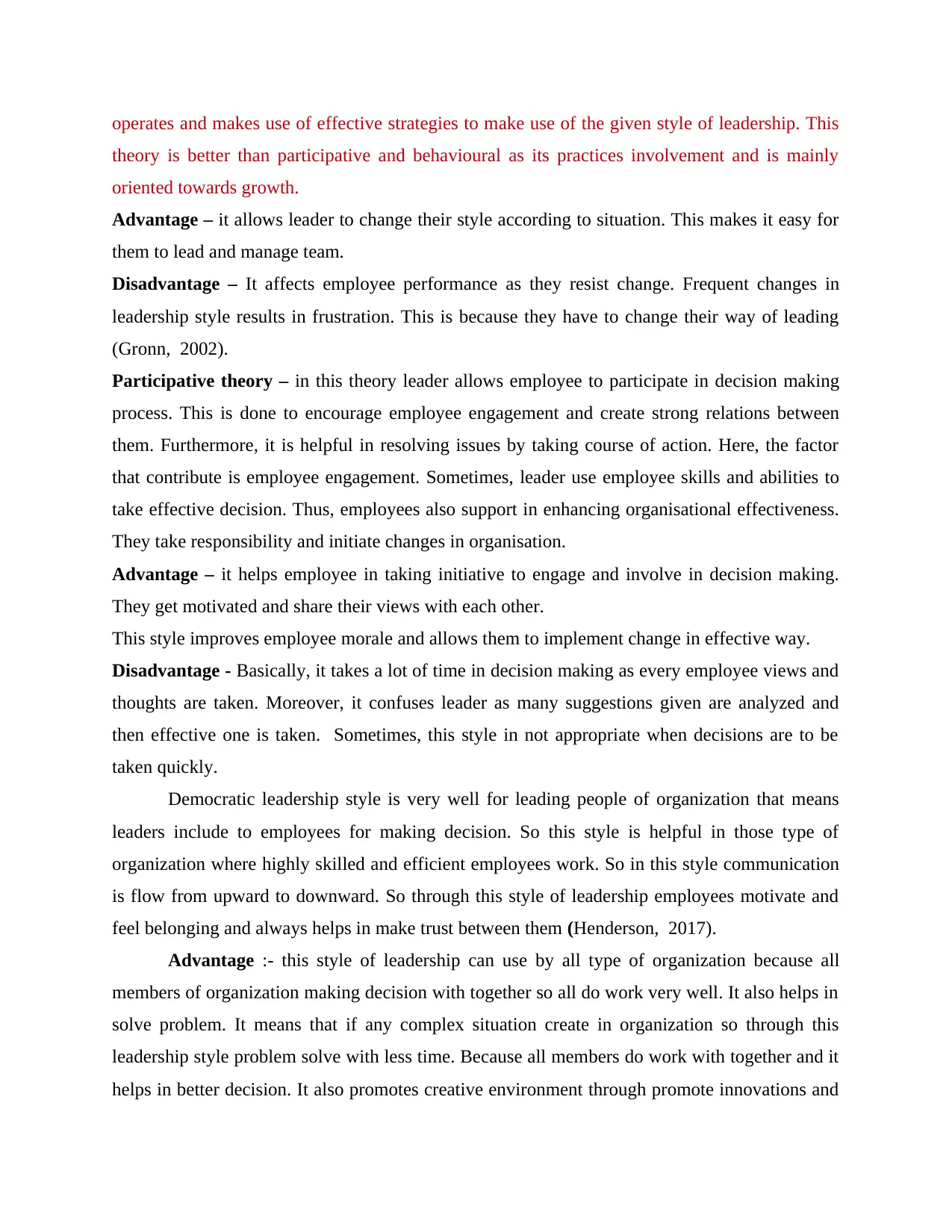
operates and makes use of effective strategies to make use of the given style of leadership. This
theory is better than participative and behavioural as its practices involvement and is mainly
oriented towards growth.
Advantage – it allows leader to change their style according to situation. This makes it easy for
them to lead and manage team.
Disadvantage – It affects employee performance as they resist change. Frequent changes in
leadership style results in frustration. This is because they have to change their way of leading
(Gronn, 2002).
Participative theory – in this theory leader allows employee to participate in decision making
process. This is done to encourage employee engagement and create strong relations between
them. Furthermore, it is helpful in resolving issues by taking course of action. Here, the factor
that contribute is employee engagement. Sometimes, leader use employee skills and abilities to
take effective decision. Thus, employees also support in enhancing organisational effectiveness.
They take responsibility and initiate changes in organisation.
Advantage – it helps employee in taking initiative to engage and involve in decision making.
They get motivated and share their views with each other.
This style improves employee morale and allows them to implement change in effective way.
Disadvantage - Basically, it takes a lot of time in decision making as every employee views and
thoughts are taken. Moreover, it confuses leader as many suggestions given are analyzed and
then effective one is taken. Sometimes, this style in not appropriate when decisions are to be
taken quickly.
Democratic leadership style is very well for leading people of organization that means
leaders include to employees for making decision. So this style is helpful in those type of
organization where highly skilled and efficient employees work. So in this style communication
is flow from upward to downward. So through this style of leadership employees motivate and
feel belonging and always helps in make trust between them (Henderson, 2017).
Advantage :- this style of leadership can use by all type of organization because all
members of organization making decision with together so all do work very well. It also helps in
solve problem. It means that if any complex situation create in organization so through this
leadership style problem solve with less time. Because all members do work with together and it
helps in better decision. It also promotes creative environment through promote innovations and
theory is better than participative and behavioural as its practices involvement and is mainly
oriented towards growth.
Advantage – it allows leader to change their style according to situation. This makes it easy for
them to lead and manage team.
Disadvantage – It affects employee performance as they resist change. Frequent changes in
leadership style results in frustration. This is because they have to change their way of leading
(Gronn, 2002).
Participative theory – in this theory leader allows employee to participate in decision making
process. This is done to encourage employee engagement and create strong relations between
them. Furthermore, it is helpful in resolving issues by taking course of action. Here, the factor
that contribute is employee engagement. Sometimes, leader use employee skills and abilities to
take effective decision. Thus, employees also support in enhancing organisational effectiveness.
They take responsibility and initiate changes in organisation.
Advantage – it helps employee in taking initiative to engage and involve in decision making.
They get motivated and share their views with each other.
This style improves employee morale and allows them to implement change in effective way.
Disadvantage - Basically, it takes a lot of time in decision making as every employee views and
thoughts are taken. Moreover, it confuses leader as many suggestions given are analyzed and
then effective one is taken. Sometimes, this style in not appropriate when decisions are to be
taken quickly.
Democratic leadership style is very well for leading people of organization that means
leaders include to employees for making decision. So this style is helpful in those type of
organization where highly skilled and efficient employees work. So in this style communication
is flow from upward to downward. So through this style of leadership employees motivate and
feel belonging and always helps in make trust between them (Henderson, 2017).
Advantage :- this style of leadership can use by all type of organization because all
members of organization making decision with together so all do work very well. It also helps in
solve problem. It means that if any complex situation create in organization so through this
leadership style problem solve with less time. Because all members do work with together and it
helps in better decision. It also promotes creative environment through promote innovations and
⊘ This is a preview!⊘
Do you want full access?
Subscribe today to unlock all pages.

Trusted by 1+ million students worldwide
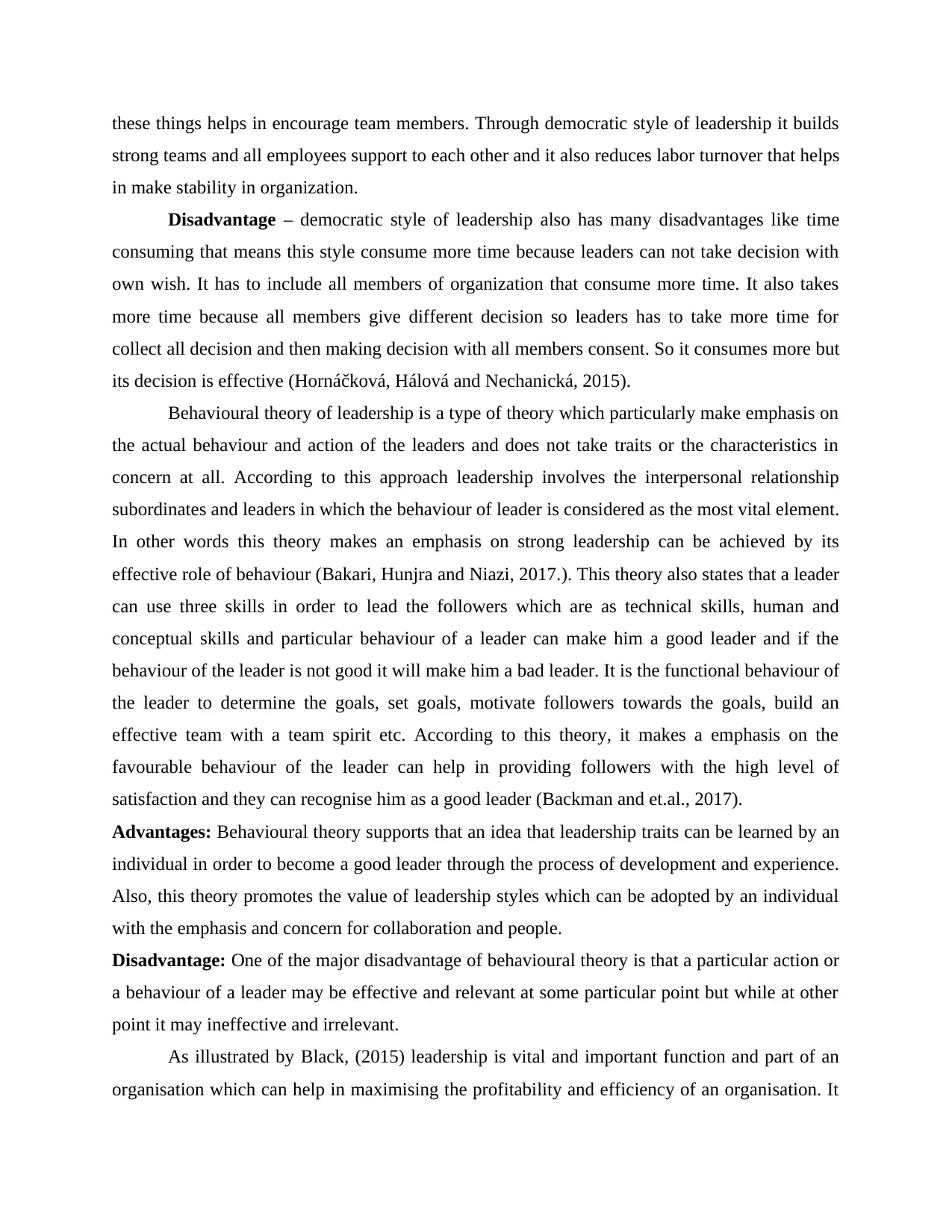
these things helps in encourage team members. Through democratic style of leadership it builds
strong teams and all employees support to each other and it also reduces labor turnover that helps
in make stability in organization.
Disadvantage – democratic style of leadership also has many disadvantages like time
consuming that means this style consume more time because leaders can not take decision with
own wish. It has to include all members of organization that consume more time. It also takes
more time because all members give different decision so leaders has to take more time for
collect all decision and then making decision with all members consent. So it consumes more but
its decision is effective (Hornáčková, Hálová and Nechanická, 2015).
Behavioural theory of leadership is a type of theory which particularly make emphasis on
the actual behaviour and action of the leaders and does not take traits or the characteristics in
concern at all. According to this approach leadership involves the interpersonal relationship
subordinates and leaders in which the behaviour of leader is considered as the most vital element.
In other words this theory makes an emphasis on strong leadership can be achieved by its
effective role of behaviour (Bakari, Hunjra and Niazi, 2017.). This theory also states that a leader
can use three skills in order to lead the followers which are as technical skills, human and
conceptual skills and particular behaviour of a leader can make him a good leader and if the
behaviour of the leader is not good it will make him a bad leader. It is the functional behaviour of
the leader to determine the goals, set goals, motivate followers towards the goals, build an
effective team with a team spirit etc. According to this theory, it makes a emphasis on the
favourable behaviour of the leader can help in providing followers with the high level of
satisfaction and they can recognise him as a good leader (Backman and et.al., 2017).
Advantages: Behavioural theory supports that an idea that leadership traits can be learned by an
individual in order to become a good leader through the process of development and experience.
Also, this theory promotes the value of leadership styles which can be adopted by an individual
with the emphasis and concern for collaboration and people.
Disadvantage: One of the major disadvantage of behavioural theory is that a particular action or
a behaviour of a leader may be effective and relevant at some particular point but while at other
point it may ineffective and irrelevant.
As illustrated by Black, (2015) leadership is vital and important function and part of an
organisation which can help in maximising the profitability and efficiency of an organisation. It
strong teams and all employees support to each other and it also reduces labor turnover that helps
in make stability in organization.
Disadvantage – democratic style of leadership also has many disadvantages like time
consuming that means this style consume more time because leaders can not take decision with
own wish. It has to include all members of organization that consume more time. It also takes
more time because all members give different decision so leaders has to take more time for
collect all decision and then making decision with all members consent. So it consumes more but
its decision is effective (Hornáčková, Hálová and Nechanická, 2015).
Behavioural theory of leadership is a type of theory which particularly make emphasis on
the actual behaviour and action of the leaders and does not take traits or the characteristics in
concern at all. According to this approach leadership involves the interpersonal relationship
subordinates and leaders in which the behaviour of leader is considered as the most vital element.
In other words this theory makes an emphasis on strong leadership can be achieved by its
effective role of behaviour (Bakari, Hunjra and Niazi, 2017.). This theory also states that a leader
can use three skills in order to lead the followers which are as technical skills, human and
conceptual skills and particular behaviour of a leader can make him a good leader and if the
behaviour of the leader is not good it will make him a bad leader. It is the functional behaviour of
the leader to determine the goals, set goals, motivate followers towards the goals, build an
effective team with a team spirit etc. According to this theory, it makes a emphasis on the
favourable behaviour of the leader can help in providing followers with the high level of
satisfaction and they can recognise him as a good leader (Backman and et.al., 2017).
Advantages: Behavioural theory supports that an idea that leadership traits can be learned by an
individual in order to become a good leader through the process of development and experience.
Also, this theory promotes the value of leadership styles which can be adopted by an individual
with the emphasis and concern for collaboration and people.
Disadvantage: One of the major disadvantage of behavioural theory is that a particular action or
a behaviour of a leader may be effective and relevant at some particular point but while at other
point it may ineffective and irrelevant.
As illustrated by Black, (2015) leadership is vital and important function and part of an
organisation which can help in maximising the profitability and efficiency of an organisation. It
Paraphrase This Document
Need a fresh take? Get an instant paraphrase of this document with our AI Paraphraser
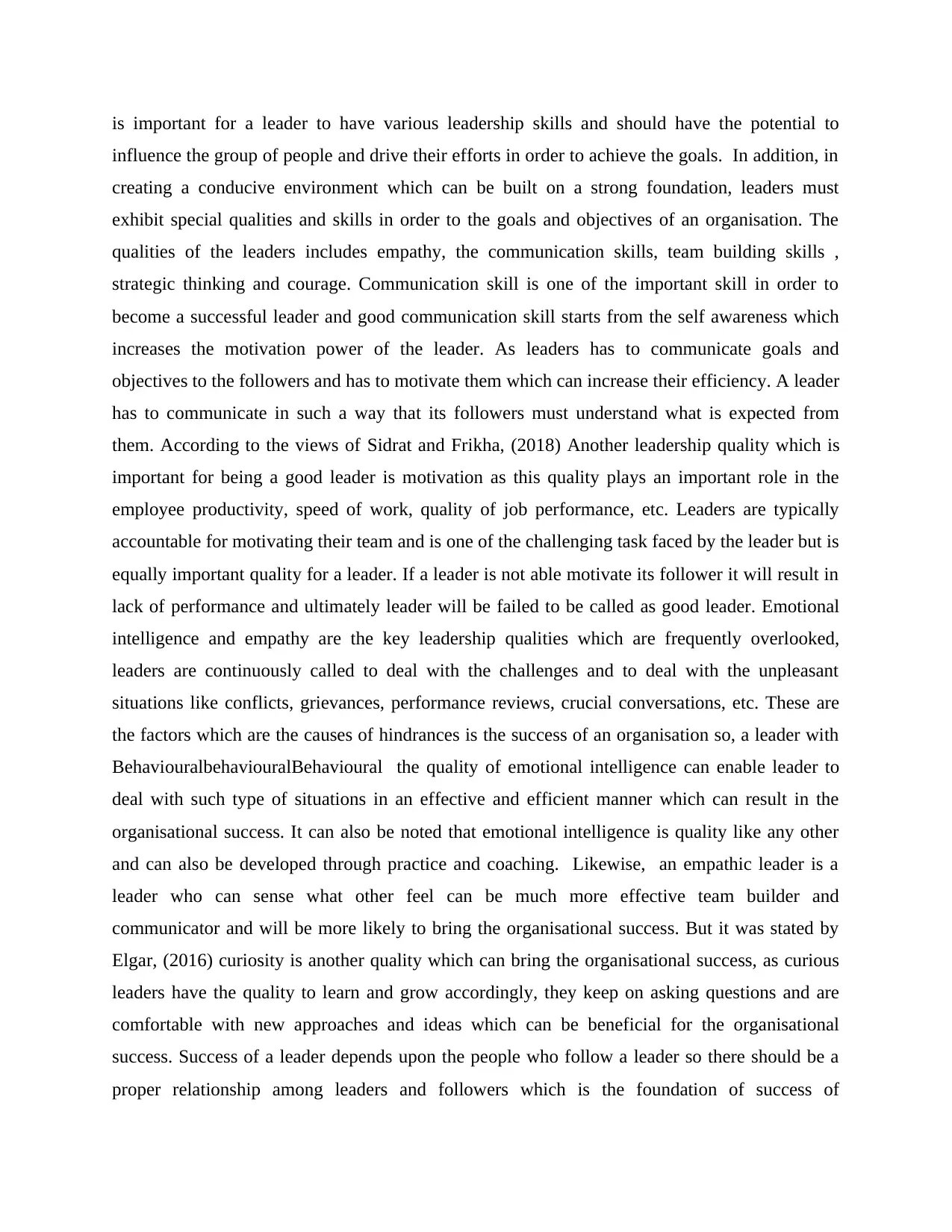
is important for a leader to have various leadership skills and should have the potential to
influence the group of people and drive their efforts in order to achieve the goals. In addition, in
creating a conducive environment which can be built on a strong foundation, leaders must
exhibit special qualities and skills in order to the goals and objectives of an organisation. The
qualities of the leaders includes empathy, the communication skills, team building skills ,
strategic thinking and courage. Communication skill is one of the important skill in order to
become a successful leader and good communication skill starts from the self awareness which
increases the motivation power of the leader. As leaders has to communicate goals and
objectives to the followers and has to motivate them which can increase their efficiency. A leader
has to communicate in such a way that its followers must understand what is expected from
them. According to the views of Sidrat and Frikha, (2018) Another leadership quality which is
important for being a good leader is motivation as this quality plays an important role in the
employee productivity, speed of work, quality of job performance, etc. Leaders are typically
accountable for motivating their team and is one of the challenging task faced by the leader but is
equally important quality for a leader. If a leader is not able motivate its follower it will result in
lack of performance and ultimately leader will be failed to be called as good leader. Emotional
intelligence and empathy are the key leadership qualities which are frequently overlooked,
leaders are continuously called to deal with the challenges and to deal with the unpleasant
situations like conflicts, grievances, performance reviews, crucial conversations, etc. These are
the factors which are the causes of hindrances is the success of an organisation so, a leader with
BehaviouralbehaviouralBehavioural the quality of emotional intelligence can enable leader to
deal with such type of situations in an effective and efficient manner which can result in the
organisational success. It can also be noted that emotional intelligence is quality like any other
and can also be developed through practice and coaching. Likewise, an empathic leader is a
leader who can sense what other feel can be much more effective team builder and
communicator and will be more likely to bring the organisational success. But it was stated by
Elgar, (2016) curiosity is another quality which can bring the organisational success, as curious
leaders have the quality to learn and grow accordingly, they keep on asking questions and are
comfortable with new approaches and ideas which can be beneficial for the organisational
success. Success of a leader depends upon the people who follow a leader so there should be a
proper relationship among leaders and followers which is the foundation of success of
influence the group of people and drive their efforts in order to achieve the goals. In addition, in
creating a conducive environment which can be built on a strong foundation, leaders must
exhibit special qualities and skills in order to the goals and objectives of an organisation. The
qualities of the leaders includes empathy, the communication skills, team building skills ,
strategic thinking and courage. Communication skill is one of the important skill in order to
become a successful leader and good communication skill starts from the self awareness which
increases the motivation power of the leader. As leaders has to communicate goals and
objectives to the followers and has to motivate them which can increase their efficiency. A leader
has to communicate in such a way that its followers must understand what is expected from
them. According to the views of Sidrat and Frikha, (2018) Another leadership quality which is
important for being a good leader is motivation as this quality plays an important role in the
employee productivity, speed of work, quality of job performance, etc. Leaders are typically
accountable for motivating their team and is one of the challenging task faced by the leader but is
equally important quality for a leader. If a leader is not able motivate its follower it will result in
lack of performance and ultimately leader will be failed to be called as good leader. Emotional
intelligence and empathy are the key leadership qualities which are frequently overlooked,
leaders are continuously called to deal with the challenges and to deal with the unpleasant
situations like conflicts, grievances, performance reviews, crucial conversations, etc. These are
the factors which are the causes of hindrances is the success of an organisation so, a leader with
BehaviouralbehaviouralBehavioural the quality of emotional intelligence can enable leader to
deal with such type of situations in an effective and efficient manner which can result in the
organisational success. It can also be noted that emotional intelligence is quality like any other
and can also be developed through practice and coaching. Likewise, an empathic leader is a
leader who can sense what other feel can be much more effective team builder and
communicator and will be more likely to bring the organisational success. But it was stated by
Elgar, (2016) curiosity is another quality which can bring the organisational success, as curious
leaders have the quality to learn and grow accordingly, they keep on asking questions and are
comfortable with new approaches and ideas which can be beneficial for the organisational
success. Success of a leader depends upon the people who follow a leader so there should be a
proper relationship among leaders and followers which is the foundation of success of
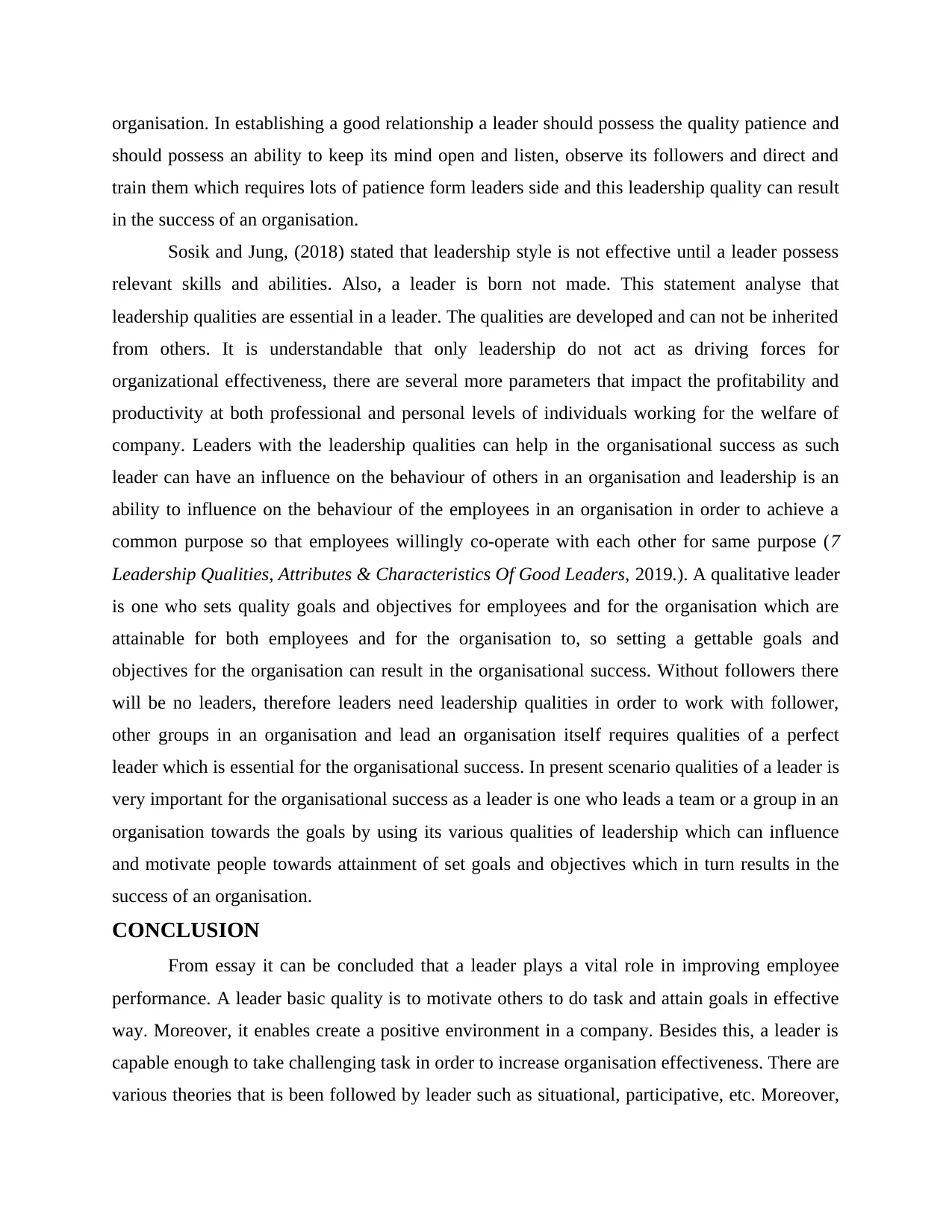
organisation. In establishing a good relationship a leader should possess the quality patience and
should possess an ability to keep its mind open and listen, observe its followers and direct and
train them which requires lots of patience form leaders side and this leadership quality can result
in the success of an organisation.
Sosik and Jung, (2018) stated that leadership style is not effective until a leader possess
relevant skills and abilities. Also, a leader is born not made. This statement analyse that
leadership qualities are essential in a leader. The qualities are developed and can not be inherited
from others. It is understandable that only leadership do not act as driving forces for
organizational effectiveness, there are several more parameters that impact the profitability and
productivity at both professional and personal levels of individuals working for the welfare of
company. Leaders with the leadership qualities can help in the organisational success as such
leader can have an influence on the behaviour of others in an organisation and leadership is an
ability to influence on the behaviour of the employees in an organisation in order to achieve a
common purpose so that employees willingly co-operate with each other for same purpose (7
Leadership Qualities, Attributes & Characteristics Of Good Leaders, 2019.). A qualitative leader
is one who sets quality goals and objectives for employees and for the organisation which are
attainable for both employees and for the organisation to, so setting a gettable goals and
objectives for the organisation can result in the organisational success. Without followers there
will be no leaders, therefore leaders need leadership qualities in order to work with follower,
other groups in an organisation and lead an organisation itself requires qualities of a perfect
leader which is essential for the organisational success. In present scenario qualities of a leader is
very important for the organisational success as a leader is one who leads a team or a group in an
organisation towards the goals by using its various qualities of leadership which can influence
and motivate people towards attainment of set goals and objectives which in turn results in the
success of an organisation.
CONCLUSION
From essay it can be concluded that a leader plays a vital role in improving employee
performance. A leader basic quality is to motivate others to do task and attain goals in effective
way. Moreover, it enables create a positive environment in a company. Besides this, a leader is
capable enough to take challenging task in order to increase organisation effectiveness. There are
various theories that is been followed by leader such as situational, participative, etc. Moreover,
should possess an ability to keep its mind open and listen, observe its followers and direct and
train them which requires lots of patience form leaders side and this leadership quality can result
in the success of an organisation.
Sosik and Jung, (2018) stated that leadership style is not effective until a leader possess
relevant skills and abilities. Also, a leader is born not made. This statement analyse that
leadership qualities are essential in a leader. The qualities are developed and can not be inherited
from others. It is understandable that only leadership do not act as driving forces for
organizational effectiveness, there are several more parameters that impact the profitability and
productivity at both professional and personal levels of individuals working for the welfare of
company. Leaders with the leadership qualities can help in the organisational success as such
leader can have an influence on the behaviour of others in an organisation and leadership is an
ability to influence on the behaviour of the employees in an organisation in order to achieve a
common purpose so that employees willingly co-operate with each other for same purpose (7
Leadership Qualities, Attributes & Characteristics Of Good Leaders, 2019.). A qualitative leader
is one who sets quality goals and objectives for employees and for the organisation which are
attainable for both employees and for the organisation to, so setting a gettable goals and
objectives for the organisation can result in the organisational success. Without followers there
will be no leaders, therefore leaders need leadership qualities in order to work with follower,
other groups in an organisation and lead an organisation itself requires qualities of a perfect
leader which is essential for the organisational success. In present scenario qualities of a leader is
very important for the organisational success as a leader is one who leads a team or a group in an
organisation towards the goals by using its various qualities of leadership which can influence
and motivate people towards attainment of set goals and objectives which in turn results in the
success of an organisation.
CONCLUSION
From essay it can be concluded that a leader plays a vital role in improving employee
performance. A leader basic quality is to motivate others to do task and attain goals in effective
way. Moreover, it enables create a positive environment in a company. Besides this, a leader is
capable enough to take challenging task in order to increase organisation effectiveness. There are
various theories that is been followed by leader such as situational, participative, etc. Moreover,
⊘ This is a preview!⊘
Do you want full access?
Subscribe today to unlock all pages.

Trusted by 1+ million students worldwide
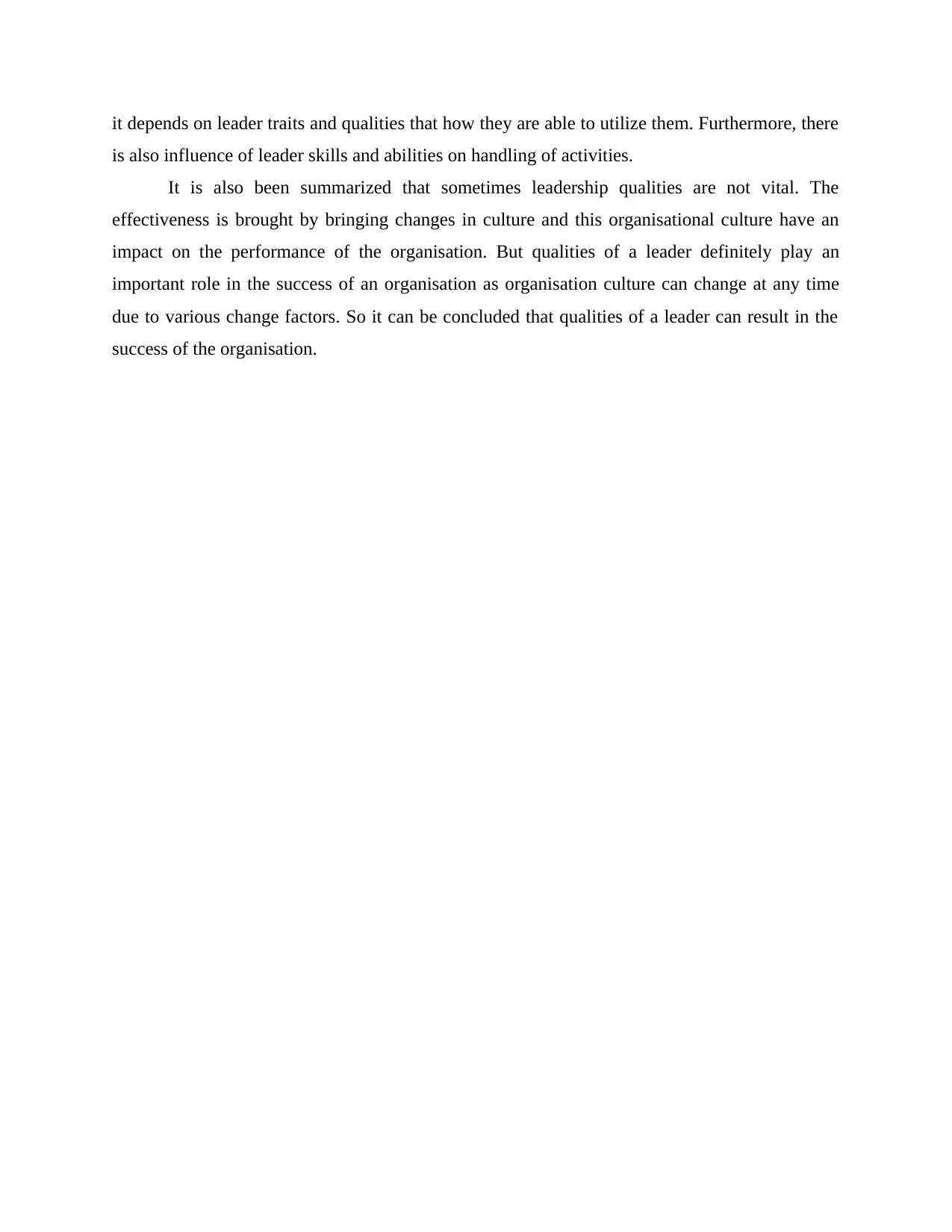
it depends on leader traits and qualities that how they are able to utilize them. Furthermore, there
is also influence of leader skills and abilities on handling of activities.
It is also been summarized that sometimes leadership qualities are not vital. The
effectiveness is brought by bringing changes in culture and this organisational culture have an
impact on the performance of the organisation. But qualities of a leader definitely play an
important role in the success of an organisation as organisation culture can change at any time
due to various change factors. So it can be concluded that qualities of a leader can result in the
success of the organisation.
is also influence of leader skills and abilities on handling of activities.
It is also been summarized that sometimes leadership qualities are not vital. The
effectiveness is brought by bringing changes in culture and this organisational culture have an
impact on the performance of the organisation. But qualities of a leader definitely play an
important role in the success of an organisation as organisation culture can change at any time
due to various change factors. So it can be concluded that qualities of a leader can result in the
success of the organisation.
Paraphrase This Document
Need a fresh take? Get an instant paraphrase of this document with our AI Paraphraser
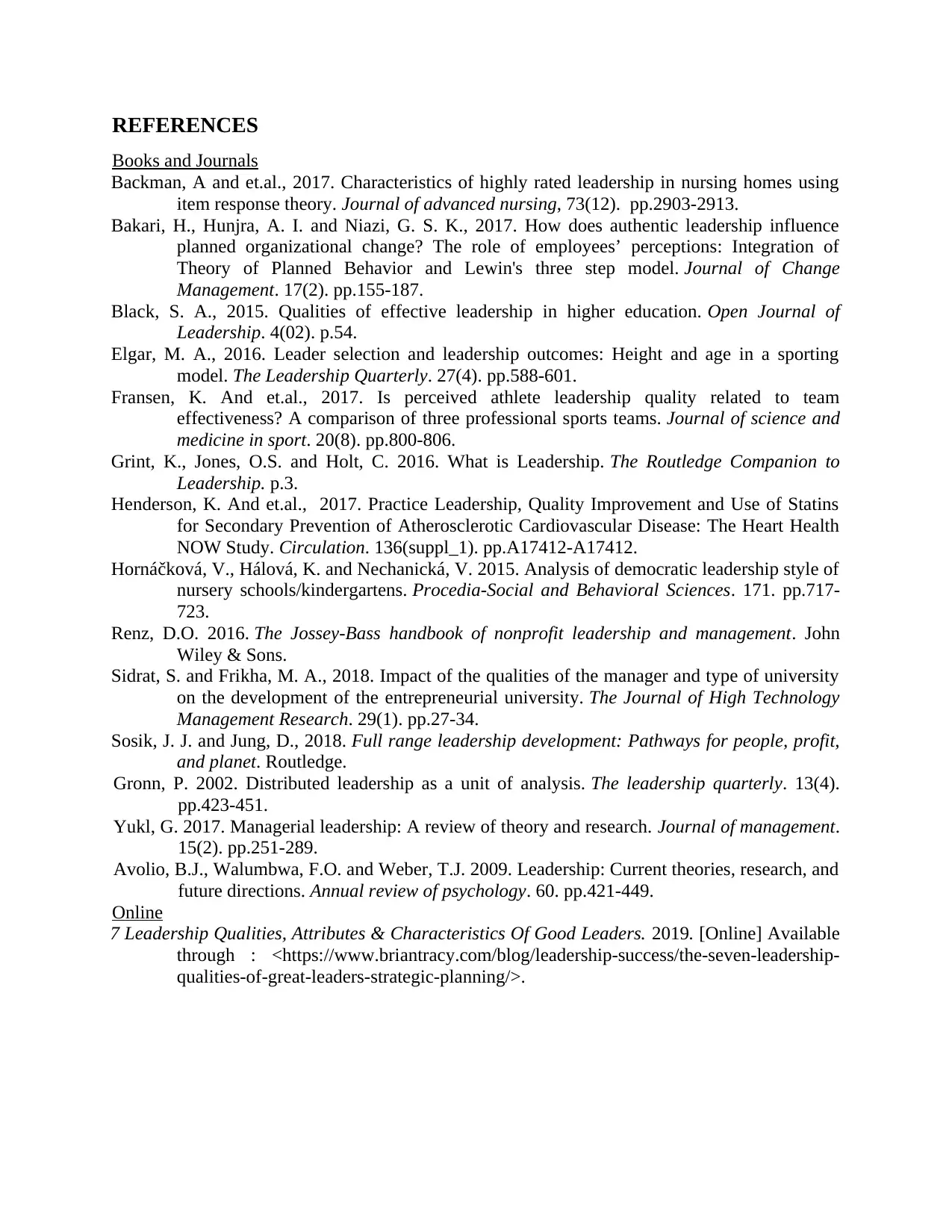
REFERENCES
Books and Journals
Backman, A and et.al., 2017. Characteristics of highly rated leadership in nursing homes using
item response theory. Journal of advanced nursing, 73(12). pp.2903-2913.
Bakari, H., Hunjra, A. I. and Niazi, G. S. K., 2017. How does authentic leadership influence
planned organizational change? The role of employees’ perceptions: Integration of
Theory of Planned Behavior and Lewin's three step model. Journal of Change
Management. 17(2). pp.155-187.
Black, S. A., 2015. Qualities of effective leadership in higher education. Open Journal of
Leadership. 4(02). p.54.
Elgar, M. A., 2016. Leader selection and leadership outcomes: Height and age in a sporting
model. The Leadership Quarterly. 27(4). pp.588-601.
Fransen, K. And et.al., 2017. Is perceived athlete leadership quality related to team
effectiveness? A comparison of three professional sports teams. Journal of science and
medicine in sport. 20(8). pp.800-806.
Grint, K., Jones, O.S. and Holt, C. 2016. What is Leadership. The Routledge Companion to
Leadership. p.3.
Henderson, K. And et.al., 2017. Practice Leadership, Quality Improvement and Use of Statins
for Secondary Prevention of Atherosclerotic Cardiovascular Disease: The Heart Health
NOW Study. Circulation. 136(suppl_1). pp.A17412-A17412.
Hornáčková, V., Hálová, K. and Nechanická, V. 2015. Analysis of democratic leadership style of
nursery schools/kindergartens. Procedia-Social and Behavioral Sciences. 171. pp.717-
723.
Renz, D.O. 2016. The Jossey-Bass handbook of nonprofit leadership and management. John
Wiley & Sons.
Sidrat, S. and Frikha, M. A., 2018. Impact of the qualities of the manager and type of university
on the development of the entrepreneurial university. The Journal of High Technology
Management Research. 29(1). pp.27-34.
Sosik, J. J. and Jung, D., 2018. Full range leadership development: Pathways for people, profit,
and planet. Routledge.
Gronn, P. 2002. Distributed leadership as a unit of analysis. The leadership quarterly. 13(4).
pp.423-451.
Yukl, G. 2017. Managerial leadership: A review of theory and research. Journal of management.
15(2). pp.251-289.
Avolio, B.J., Walumbwa, F.O. and Weber, T.J. 2009. Leadership: Current theories, research, and
future directions. Annual review of psychology. 60. pp.421-449.
Online
7 Leadership Qualities, Attributes & Characteristics Of Good Leaders. 2019. [Online] Available
through : <https://www.briantracy.com/blog/leadership-success/the-seven-leadership-
qualities-of-great-leaders-strategic-planning/>.
Books and Journals
Backman, A and et.al., 2017. Characteristics of highly rated leadership in nursing homes using
item response theory. Journal of advanced nursing, 73(12). pp.2903-2913.
Bakari, H., Hunjra, A. I. and Niazi, G. S. K., 2017. How does authentic leadership influence
planned organizational change? The role of employees’ perceptions: Integration of
Theory of Planned Behavior and Lewin's three step model. Journal of Change
Management. 17(2). pp.155-187.
Black, S. A., 2015. Qualities of effective leadership in higher education. Open Journal of
Leadership. 4(02). p.54.
Elgar, M. A., 2016. Leader selection and leadership outcomes: Height and age in a sporting
model. The Leadership Quarterly. 27(4). pp.588-601.
Fransen, K. And et.al., 2017. Is perceived athlete leadership quality related to team
effectiveness? A comparison of three professional sports teams. Journal of science and
medicine in sport. 20(8). pp.800-806.
Grint, K., Jones, O.S. and Holt, C. 2016. What is Leadership. The Routledge Companion to
Leadership. p.3.
Henderson, K. And et.al., 2017. Practice Leadership, Quality Improvement and Use of Statins
for Secondary Prevention of Atherosclerotic Cardiovascular Disease: The Heart Health
NOW Study. Circulation. 136(suppl_1). pp.A17412-A17412.
Hornáčková, V., Hálová, K. and Nechanická, V. 2015. Analysis of democratic leadership style of
nursery schools/kindergartens. Procedia-Social and Behavioral Sciences. 171. pp.717-
723.
Renz, D.O. 2016. The Jossey-Bass handbook of nonprofit leadership and management. John
Wiley & Sons.
Sidrat, S. and Frikha, M. A., 2018. Impact of the qualities of the manager and type of university
on the development of the entrepreneurial university. The Journal of High Technology
Management Research. 29(1). pp.27-34.
Sosik, J. J. and Jung, D., 2018. Full range leadership development: Pathways for people, profit,
and planet. Routledge.
Gronn, P. 2002. Distributed leadership as a unit of analysis. The leadership quarterly. 13(4).
pp.423-451.
Yukl, G. 2017. Managerial leadership: A review of theory and research. Journal of management.
15(2). pp.251-289.
Avolio, B.J., Walumbwa, F.O. and Weber, T.J. 2009. Leadership: Current theories, research, and
future directions. Annual review of psychology. 60. pp.421-449.
Online
7 Leadership Qualities, Attributes & Characteristics Of Good Leaders. 2019. [Online] Available
through : <https://www.briantracy.com/blog/leadership-success/the-seven-leadership-
qualities-of-great-leaders-strategic-planning/>.
1 out of 11
Related Documents
Your All-in-One AI-Powered Toolkit for Academic Success.
+13062052269
info@desklib.com
Available 24*7 on WhatsApp / Email
![[object Object]](/_next/static/media/star-bottom.7253800d.svg)
Unlock your academic potential
Copyright © 2020–2026 A2Z Services. All Rights Reserved. Developed and managed by ZUCOL.



